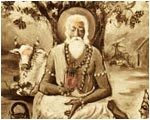 There was once a prince, a minister’s son, and a treasurer’s son who were all close friends. Once upon a time, all three of them set out on a long journey to different distant lands. On the way they happened to arrive at a royal palace where the king of that land was absent, but his daughter, the princess, was staying there along with her two closest friends – one the minister’s daughter and the other the treasurer’s daughter of that land. Those three ladies were also similarly close friends like the prince, the minister’s son and the treasurer’s son mentioned above.
There was once a prince, a minister’s son, and a treasurer’s son who were all close friends. Once upon a time, all three of them set out on a long journey to different distant lands. On the way they happened to arrive at a royal palace where the king of that land was absent, but his daughter, the princess, was staying there along with her two closest friends – one the minister’s daughter and the other the treasurer’s daughter of that land. Those three ladies were also similarly close friends like the prince, the minister’s son and the treasurer’s son mentioned above.
The prince and his two friends exchanged their acquaintances with the princess and her two consorts. And it wasn’t long before the three young men proposed to marry those three damsels. But they hesitated as it was custom to get permission from their respective parents for the marriage. However, they decided to marry without further delay, according to the old saying “anything auspicious should be hastened.”
So their happy marriages were solemnised. Thereafter the king of the land, with his minister and treasurer, came back from their travels and entered the royal palace only to see in great astonishment, that the princess and her two friends were chatting with three strangers. Upon hearing that those three men had trespassed into the royal palace, only to flirt with the young women and talk them into an illegal marriage, the king ordered their arrest.
The princess then begged her father to release her husband. The treasurer’s daughter and the minister’s daughter, also respectively fell on their knees in front of their fathers and begged them for their husbands’ release. However, the king did not release the young husbands, but ordered that proper respect should be shown to the young prince by tying him up with golden shackles, whereas the young son of the minister should be given silver shackles, and the treasurer’s son should be bound with iron shackles, all according to their respective status.
PURPORT
The Supreme Lord binds up all living entities similarly in three types of shackles, namely the material modes, according to the reactions of their respective fruitive activities. The bondage of goodness may very well be compared to golden shackles, that of passion to silver shackles, and the entanglement in ignorance is tantamount to iron shackles.
Whatever might be the elements or metals with which the shackles are made, they are simply meant for imprisonment. Unless and until one goes beyond these three material modes or entanglements, one can never be considered free and liberated. Only one who completely surrenders unto the lotus feet of the Supreme Lord unconditionally may thus be delivered from such bondage.



